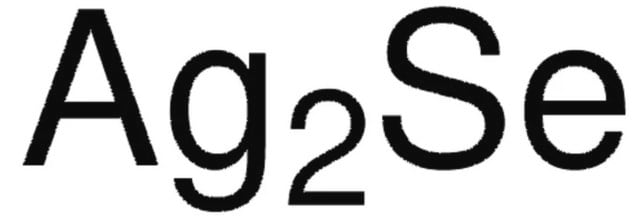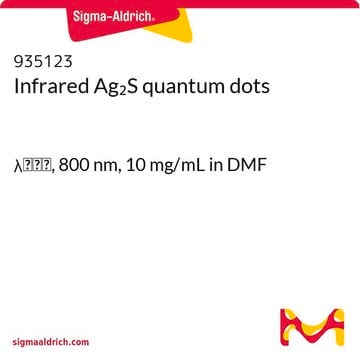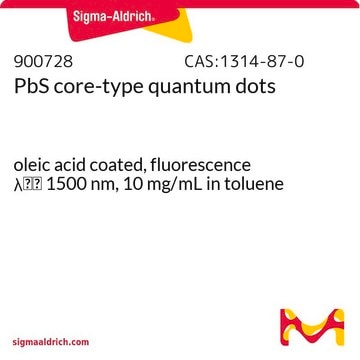935093
Infrared PbS quantum dots
λmax, 1250 nm, 100 mg/mL in toluene
Synonim(y):
Fluorescent nanocrystals, INFIQ® quantum dots, Lead based core type QDs
About This Item
Polecane produkty
opis
λmax > 5 peak/valley ratio
Poziom jakości
Postać
liquid
stężenie
100 mg/mL in toluene
wielkość cząstki
<15 nm (Nanoparticle)
λmaks.
1250 nm
<90 nm (FWHM)
temp. przechowywania
2-8°C
InChI
1S/Pb.S
Klucz InChI
XCAUINMIESBTBL-UHFFFAOYSA-N
Szukasz podobnych produktów? Odwiedź Przewodnik dotyczący porównywania produktów
Powiązane kategorie
Opis ogólny
Zastosowanie
Informacje prawne
produkt powiązany
Hasło ostrzegawcze
Danger
Zwroty wskazujące rodzaj zagrożenia
Zwroty wskazujące środki ostrożności
Klasyfikacja zagrożeń
Aquatic Chronic 2 - Asp. Tox. 1 - Flam. Liq. 2 - Repr. 1A - Skin Irrit. 2 - STOT RE 2 - STOT RE 2 Inhalation - STOT SE 3
Organy docelowe
Central nervous system
Kod klasy składowania
3 - Flammable liquids
Klasa zagrożenia wodnego (WGK)
WGK 3
Temperatura zapłonu (°F)
39.2 °F
Temperatura zapłonu (°C)
4 °C
Certyfikaty analizy (CoA)
Poszukaj Certyfikaty analizy (CoA), wpisując numer partii/serii produktów. Numery serii i partii można znaleźć na etykiecie produktu po słowach „seria” lub „partia”.
Masz już ten produkt?
Dokumenty związane z niedawno zakupionymi produktami zostały zamieszczone w Bibliotece dokumentów.
Nasz zespół naukowców ma doświadczenie we wszystkich obszarach badań, w tym w naukach przyrodniczych, materiałoznawstwie, syntezie chemicznej, chromatografii, analityce i wielu innych dziedzinach.
Skontaktuj się z zespołem ds. pomocy technicznej








